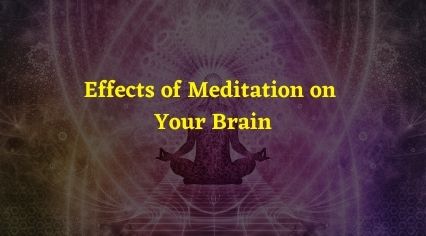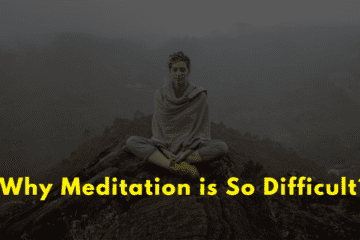What Happens to Your Brain When you Meditate!

What happens to your brain when you meditate? The searches for this query are rising day by day over the internet. The reason is there are various types of meditation and thousands of yoga & meditation schools are teaching them in the name of meditation for stress, meditation for anxiety, depression, distraction and what not.
No matter that meditation helps you cure all of these problems but the question remains what happens to your brain when you meditate?
There are a number of types of meditations but the most famous and experimented form of meditation is mindfulness meditation.
It may look easy but it is not so.
In short mindfulness meditation is being aware of the present moment without being judgemental.
Table of Contents
What Happens to Your Brain When you Meditate?
Meditation is the process of bringing our brain in the present moment by stopping it wander in past, future because the present is what we have past and future are just thoughts in our mind repeating themselves in new ways.
Meditation increases the grey matter in our brain which is responsible for learning, stronger memory and awareness.
Overtime practising meditation daily increases the level of theta and alpha waves in the brain and calms down the sympathetic nervous system.
How do you Practice Mindfulness Meditation?
Mindfulness meditation means being mindful or focusing on any object it could be anything, it may your breath or sensation between your eyebrows, or it may be your little finger.
Another similar kind of meditation for beginner is Anapansati Meditation- which involves focusing on the natural flow of breath. The promoter of Anapansati meditation was “Gautam Buddha” himself.
No high-level training is needed for such kinds of meditation, they can be done by anyone irrespective of place, time, race, religion.
To begin with mindfulness meditation you simply need to find a place where you could sit comfortably. It could be your office chair also if you are practising it in office.
As I said earlier it can be done anywhere. Meditating for longer hours in office is not possible, so one thing you can do is- do it for 5-10 minutes, for 3-4 times as the main objective is to become more aware and conscious.
After finding a perfect place bring your focus between your eyebrows or on the breath. Try to ignore other things.
If you are a beginner in meditation, as soon as you try to focus on your breath or between your eyebrows you may feel some kind of sensation in those particular areas just try to ignore them.
Many thoughts will arise be aware of them but don’t be judge-mental let them pass, do not get stick with them, let them happen, you just be mindful and bring the focus back on your breath.
Thoughts are the natural phenomena of mind, do not get distracted with them.
I know for a beginner it may difficult at the start. You may get carried away with them. It happens!
No worries, with regular practice you will be able to focus more without getting distracted.
Effects of Meditation on your Brain
In simple terms, if I want to make you understand is – If you use anything for a longer period of time you become master at it.
Just like that the more work your brain does it gets developed beyond normal. As our brain is also a part which gets better with maximum use.
The brain consists of thousands and thousands of neurons in it, which acts as an information cell generating thousands of thoughts in our mind.
These neurons are interconnected with each other making us feel different sensations, feelings happening in our body.
The neural connections get developed and strengthen the part of our brain associated with that activity when we continuously practice for a longer time period.
Look at those famous footballers how they make the ball obey their order, how their mind and body are in complete sync. This is because of the regular practice they are doing which strengthens the connections between their neurons.
Many kinds of research are still going on What happens to your brain when you meditate? The initial outcomes have shown that meditation increases the gray matter density in the frontal regions of the brain as well as thickens the cortical.
Stronger memory, mindfulness are the results of increased grey matter in the hippocampus and the cortical thickness leads to better attention and awareness.
This data has been taken from research on individuals who practice meditation on a regular basis.
The regular practice of meditation for 48 weeks daily for 20-30 minutes shows significant changes in structure of brain and its functioning.

Meditation calms down your nervous system
It calms the nervous system and lowers fight or flight response.
When we are in a situation which we think is a threat to us our sympathetic nervous system gets into the action, which releases epinephrine hormone that makes us run or fight back.
As soon as the situation becomes normal parasympathetic nervous system activates and makes us relax.
Meditation is one such practice which lowers the functioning of this fight or flight response system and activates the parasympathetic system.
Activation of the parasympathetic nervous system for a longer period of time helps reduce stress, depression. This is what happens to your brain when you meditate.
Emotional instability can be reduced with regular practice of meditation.
Sometimes accepting the disturbing past moments is the hardest thing to do, but the regular practice of meditation creates the space between you and your mind thus making it easier to accept those unpleasant past moments.
This doesn’t means you will become the master of your brain in no time and will be able to control how you react to certain situations.
No, habits cannot be changed in a single day, but meditating regularly will develop a certain quality and alters the brain pattern in such a way that will make you think before you unconsciously react to certain similar situations.
I have experienced a drastic change on how I used to react to certain situations before starting meditation and how I am responding to them now!
Have you noticed, I used the word responding. Yes reaction is a way of unconscious mind while Response is way of conscious mind. That’s the difference meditation has made in my life.
I have found What happens to your brain when you meditate is:-
Frontal lobe
This is the most exceptionally advanced region of the mind, answerable for thinking, arranging, feelings and mindfulness. During contemplation, the frontal cortex will in general goes disconnected.
Parietal lobe
This region of the cerebrum measures tactile data about the world you live in, situating you in existence. During meditation, action in the parietal lobe eases back down.
Thalamus
It is like the security organs for the senses,this organ concentrates by piping some tactile information more profound into the brain and leaving other signals off.
Reticular formation
As the brain’s guard, this part gets all the incoming stimuli and puts the mind on an alarm, prepared to react. Meditation lowers the excitement signal.
What Happens When you Meditate Everyday?
It has found in the studies that people’s who are practicing meditation regularly for 20-25 minutes had shown increased amount of gray matter in their cortex.
It is also found that meditation slowers the ageing process and helps maintain good memory by preventing the thinning of frontal cortex. That is the reason the elderly people who are into meditation practice have shown memory power same as the 20-30-year-olds.
(Check: Meditation mat to sit comfortably)
Benefits Of Meditation for the Brain
There are numerous benefits of meditation to our brain from slowing the ageing to increasing the memory power. So what happens to your brain when you meditate is this.
For students meditation can help you get good grades. Yes, because meditation increases your ability to focus and better focus leads to better results.
Massachusetts Medical School conducted an 8 week study at their university on what happens to your brain when you meditate.
After 2 months of study they found that the participants brains not only had changed but they already started feeling more focused, conscious and aware about everything in their body and surrounding.
Scientists have classified different types of waves of form that occur inside our brains depending on their type of oscillation Such as Gamma, Alpha, Theta and Delta.
Gamma waves are most active when we are in learning mode i.e when we are learning something. Information is more easily grasped when your brain is in gamma state. Sounds good…wait!
When gets uncontrolled these same gamma waves can cause anxiety.
One of the experiment on the Tibetan monks showed that during their meditation practice the level of production of gamma waves was 3x higher than the resting states. They were having extraordinary levels of alertness even when they were in relaxed states of meditation.
Conclusion to this was the waves were functioning in their brain in complete harmony.
Beta waves the another types of waves which are active while doing day to day activities such as organizing, planning, etc
Alpha waves are related to the relaxed states of mind and body. They are more when you meditate, do yoga, walking in the nature. They acts a protection to our brain by removing your attention from unnecessary thoughts. Alpha waves increases the ability of creative thinking.
Theta waves are slower than alpha. These becomes active at deeper level of relaxation or when you are in deep sleep and also in Zen meditation.
Lastly Delta waves the slowest one’s are generated during dreamless sleep.
You don’t have to remember all such scientific names, I just mentioned these waves forms for the sake of knowing that science is also approving them what meditators have known for centuries without using any costly instruments.
Meditation is a medicine for mind, body and soul. So one must take some time from their day to day schedule to meditate, brain waves will naturally be taken care of.
Enhanced well-being
Meditation increases mind power. It increases your ability of visualization, creative thinking, compassion and empathy.
On the other hand, what happens to your brain when you meditate is, it reduces the neural connection to the part of the brains responsible for generating fear, stress, anxiety. This results in better health and wellbeing.
Meditation helps us to break those habitual patterns which have formed till now due to unconscious behavior by making us more aware and conscious of our simple activities.
Meditation practice can completely change how you function inside out, so it becomes important that you learn meditation from the authentic guide.
Here’s the guide to Zen meditation which everyone talks about but no one teaches it in its full depth.
Better Focus
The whole practice of meditation is about focusing on some object or breath or anything depends on which type of meditation you are doing. No matter how many times you lose focus, you bring it back again to that object.
This increases our ability to focus even when we are not meditating.
Meditation has long lasting effects on how our mind and body perform.
Less Anxiety
Yes, meditation leads to less anxiety. The more longer you meditate, the less anxious you become. Meditation lessens the neural connection between particular pathways which supports our ego.
Let me explain, there’s a certain region in our brain which is referred to as prefrontal cortex. This prefrontal cortex is responsible for channeling information relating to ourselves, our mind, body.
This region is has a strong neural connection with bodily sensations and fight or flight response. Hence whenever you face any life threatening situation this connections gets activated making you feel threaten or scared.
So what happens to your brain when you meditate is this neural connection gets weaken. Resulting in lower sudden reaction to such kinds of situations which otherwise triggers you up.
Meditation strengthens the connection with the assessment centre in our brain which is responsible for reasoning. This stronger connection makes us look at things rationally, in other words it helps us responds to the situation rather than reacting unconsciously.
You might have seen people’s who are afraid of the dark, how their mind and body functions when they are in dark places, ex. they suddenly start thinking of ghosts, souls and about the things that might go wrong with them.
But this is not the case once you start meditating. You become more conscious of that situation rather being fearful and starts looking at it from another perspective.
More Creativity
This is very difficult to find but yet the results found in various researches on how meditation affects our creativiy are quite amazing. Researchers from United States found that people who are into some kind of meditation practice, when asked to come up with new ideas performed better than those who do nt practice meditation.
More Compassion
Compassion and empathy levels are found to be very high in the individuals practicing any form of meditation compared to the one’s who don’t. When faced with disturbing situations meditation helps reduce sudden emotional reactions.
Another study found that people who are practicing meditation regularly have stronger level of empathy towards all living beings, than those who didn’t meditate.
Better Memory
Another benefit of meditation is memory recall. Meditation helps reduce distraction and increases focus on the given tasks ultimately leading to better productivity than those who do not practice any meditation.
Meditation alters the brain wave pattern leading stronger memory and creativity.
Less Stress
Meditation helps lower mental stress and improves one’s functioning under pressure. Many studies have shown that people who practise meditation are better at multitasking. Meditation protects our brain against information overload.
More Gray Matter
Meditating regularly leads to increased amount of gray matter in hippocampus, frontal lobe of brain which results in emotional stability and better focus.
Meditation is a practice, not a magic wand!
If you come this far,then you must be interested in doing meditation.
But let me clear one thing all the benefits and changes that meditation causes to your brain, are not going to happen on day one.
Yes, but that’s the beauty of meditation. Letting go of your thoughts of past and future and focusing on present that too without being judging it is a difficult task and I’m not saying that you should master it on day 1, but consistent practice will make you experience deeper states of meditation.
Many individuals feels more calm, composed and relaxed with 10-12 minutes of meditation.
Meditation is a journey to be enjoyed every moment and who knows you may get enlightened in the process.
If you have read till now it is clear that you have an interest in meditation or you may be already practising meditation and wanted to know what happens to your brain when you meditate. I hope you got the answer!
And if you are a beginner who wants to learn meditation from basic here is the guide to zen meditation techniques.
Also read:




1 Comment
Why Meditation Is So Difficult? · at
[…] With time and effort, you can learn to overcome these challenges and gain the benefits of meditation. […]